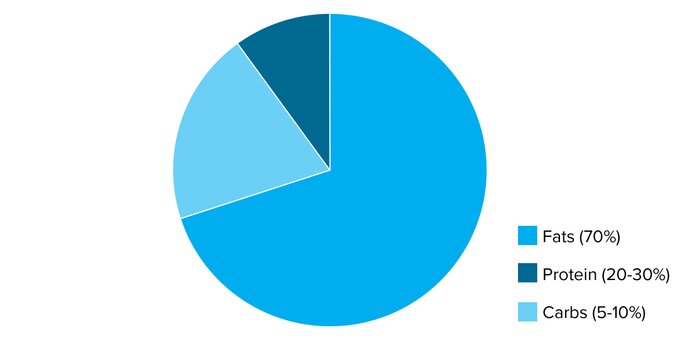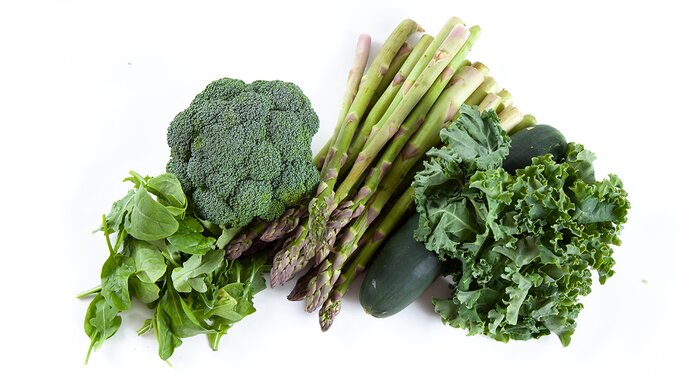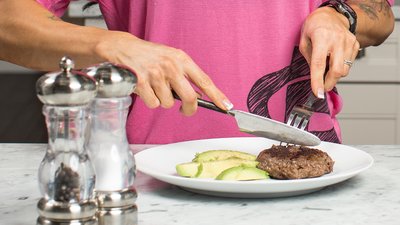How Keto Works | Keto Meal Plan | Keto for Weight Loss | Keto for Muscle Gain | Keto Mistakes & Side Effects | Best Keto Supplements
In recent years, low-carb diets have come to dominate fitness culture among those looking to lose weight. But there's low carb, and then there's keto. Low carb gives your body less of a certain macronutrient and brings your calorie count down. But the ketogenic diet goes so far as to encourage your body to burn fat as fuel!
When done right, the ketogenic diet can have major benefits beyond just weight loss. But if you know you're looking to use it to lose weight, you're in the vast majority. Here is exactly what you need to know to lose weight with keto.
How Does Keto Weight Loss Work?
The idea behind the keto diet is to get your body into a state known as "ketosis," where it stops burning carbohydrates as fuel and burns fat instead. Once you become "fat-adapted," as it is called, your body begins to tap into its stored fat and actually burn that for fuel. It also begins to produce and burn tiny organic compounds known as "ketones," which is where ketosis gets its name.
To achieve this fat-adapted state, you must take away carbohydrates as a main fuel source, and replace them in your diet with dietary fat. This means reducing your carbohydrate intake to around 5-10 percent of total calories, or around 30-50 grams per day for most people.

This is a big change from the recommended 225-335 grams or more of carbohydrates per day for a typical 2,000-calorie diet. To give yourself a bit more wiggle room in your keto weight-loss meal plan, you can focus on net carbohydrates, which is total grams of carbohydrates minus grams of fiber.
Transform your pantry and your supplement cabinet with products formulated to help you reach ketosis and stay there.
Setting Up Your Keto Macros
Unfortunately, macronutrient calculators weren't designed with keto in mind, so to accurately calculate how many grams of protein, carbs, and fat you should eat in a day, you need a customizable one that you can modify for that goal. Bodybuilding.com's macronutrient calculator features a "customize your macro ratio" option that gives you a calorie target, but allows you to dial it in for your preferred macros.

Here's a tried-and-true keto benchmark to aim for:
- Fats: 70%
- Protein: 20-30%
- Carbs: 5-10%
Set yourself up for success with snacks that fit your keto macros!
How to Create Keto Weight-Loss Meals
To start building a keto weight-loss meal plan, divide these daily totals by however many meals you plan to eat each day. This will give you guidelines to follow for each meal. For example, 50 grams of carbs, 100 grams of protein, and 155 grams of fat spread out over 5 meals equals 10 grams of carbs, 20 grams of protein, and 31 grams of fat per meal.
Since the majority of your calories need to come from fat, you'll have to switch your thinking when it comes to meal planning and focus on choosing high-fat, low-carb foods to build your meals around. Here is a list of foods to choose from:
- Fatty nuts and seeds
- Avocados
- Whole eggs
- Full-fat cheese
- Fatty cuts of meat and 80/20 ground beef
- Chicken thighs
- Olive oil and coconut oil
- Butter
- Heavy cream
- Sour cream
- Cream cheese
- Fatty fish: salmon, mackerel, sardines, anchovies
- Bacon
You'll notice this list does not have any fruits and vegetables. That's because fruit is very high in carbohydrates, as are many starchy vegetables such as potatoes, corn, and beans.

Fortunately, leafy green vegetables are OK, and you should include plenty of all of these:
- Spinach
- Kale
- Broccoli
- Romaine lettuce
- Cabbage
Other flavorful low-carb vegetables to fill your cart with include mushrooms, peppers, onions, and celery. Be sure to include plenty of these veggies in your plan not only for their vitamin content, but also for the water, fiber, and antioxidants they bring.
Common Mistakes to Avoid
First, give your body adequate time to adapt. You should expect to take a minimum of 3-4 weeks to become fully fat-adapted. Some people find it takes twice that long. Many would-be keto dieters tend to "cheat" on the weekends, denying their body the opportunity to fully convert to a fat-burning state.
If you're strictly keto all week only to carb up on the weekend, you will never achieve the benefits of full-time ketosis. You may still lose some weight, especially if you're in a calorie deficit, but chances are you'll feel tired and sluggish because your body still runs primarily on carbs.
If you want the full benefits of keto—increased fat burning, higher energy, and improved mental clarity—you have to stick with it! Experts agree you can minimize the initial side effects by paying close attention to your hydration and electrolyte levels, since you lose water when you cut carbs.

Perhaps the biggest mistake keto dieters with a fitness or lifting background make is to eat too much protein. The body can convert excess protein into glucose, which prevents your body from using fat for fuel. With more than 70 percent of your calories coming from fat, this truly is an "eat fat to burn fat" diet. You must make the shift and prioritize fat—and low-carb vegetables—to have success on this approach.
Want to dive deep into how ketosis works? The guide "Keto Diet 101: How to Use Fat as Fuel" by Catherine Saenz, Ph.D., will get you fully informed. For more keto meal ideas and information about which supplements work best with keto, Parker Hyde's article, "Ketogenic Diet: Complete Meal and Supplement Guide" is a must-read.

